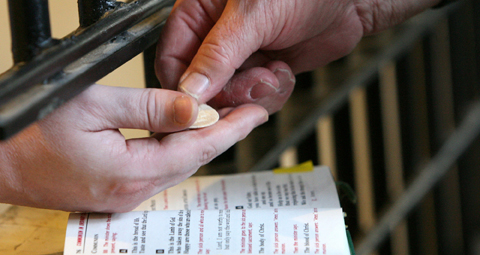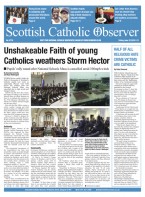June 8 | ![]() 0 COMMENTS
0 COMMENTS ![]() print
print

The role of the prison chaplain is to show the possibility of redemption
DR HARRY SCHNITKER addresses the vital role of the prison chaplain
Who am I? We were debating the title for Prisoners Week 2018, an annual event that is intended to promote awareness of the issues around imprisonment, supported by all the Churches in Scotland.
Who am I? It is an important question in our society, and our prisons are a magnifying glass for the ills that plague the wider community. Who am I? is, arguably, the key question facing any one of us, and on the answer depends much of our lives; whether I am a father or mother, a student, a practising or non-practising Catholic, unemployed, suffering from long-term illness, an immigrant, a Gael, an alcoholic or addict. Categories of being define us, and we use them to define ourselves. They are inescapable.
They are literally inescapable in prison. There, somone is defined first and foremost by the sentence ‘I am a prisoner,’ and they are defined by where they reside: C Block may be long-term prisoners; B Block may hold the short-termers. HMP Polmont means you are a young offender, HMP Cornton Vale that you are a woman.
Someone may be in a protection wing, for their own safety, or maybe because of the nature of their offence. Even inside, there are many ways of answering the question: Who am I?
One answer is simple. I am a child of God, created in His image, Redeemed by His Son’s death on Calvary. I had rejected that Redemption, but now I have a chance, the chance to ask for forgiveness for what I have done, and the chance to experience His Mercy and Love. I can change and transform who I am.
Does that happen? Yes it does, and more than most would think.
It is my privilege, and that of my colleagues, to be channels for that change. Who am I? I am a prison chaplain.
I have been a prison chaplain for a good many years now. First, I was a volunteer, then part-time, now I am the national Catholic prison chaplain (Church term) or the RC chaplaincy advisor (civil service term).
In that role, I represent the Bishops of Scotland in the prison service, support my colleague Catholic chaplains (I hope I do, anyway), help the Scottish Prison Service (SPS) to manage chaplaincy and advise both the prison service and the bishops.
It is a strange kind of job. One moment I am meeting the great and the good, the next I am in an observation cell next to someone who no longer is anything but a completely broken person, with nothing left and suicide on his mind.
There are 13 SPS prisons in Scotland, as well as two privately-run jails, with whom the SPS works closely. Among the Catholic chaplains there are priests from religious Orders (Dominicans and Xaverians), diocesan priests, deacons, sisters and lay people.
We have Scots, English, Nigerian, Polish, Ukrainian and Lithuanian chaplains; there is even a Dutchman. It is a little like running a miniature diocese, although I have never heard of a deacon with a pointy hat on!
As chaplains, we are a team. We are teams in the prisons in which we work, teams of Church of Scotland, other Reformed, Catholic and Muslim chaplains. We are also a team across the service as Catholics. We serve Catholics (of course) but are there for everyone.
The job of a prison chaplain has been likened to being a chaplain on a Royal Navy vessel. You work in an enclosed, self-contained community, where everyone knows everyone.
You serve for a determined period. Your role is recognised by all (usually) and there is that residual respect for the ‘collar’ that is now so rare elsewhere in society. All and sundry will approach the chaplain for every reason you can think of.
There is the joy: I am getting out next week, I am clean for the first time in years, I am getting married (a member of staff), the sun is shining.
Then there is the despair: This is my first time in jail and I am scared, I have lost my baby son, My daughter has committed suicide.
There is a physicality to the job. Jails are normally quite large, with long steel corridors linking the halls and the activity centres. Being a chaplain can feel a little like being a bobby on the beat—long walks and you never know what you are going to encounter. It is normally a ‘hello’; some coy, some exuberant. It may be a handshake (prisons are big on handshakes) or a chat. It may even be a theological discussion, and, occasionally, a cup of soup or a pie, if you are truly in favour.
The job has its core elements. There are the visits to those who arrived recently, the referrals by other staff, the meetings with the most vulnerable prisoners, the quiet chats with staff, both SPS and NHS. Then there are the many one-to-ones with those who wish to tell of their past misdeeds, or their past misery.
Finally, at the core of it all, the meetings with those you work most closely with, those who, rightly or wrongly, believe that working with a chaplain will give them a hotline to God and a way out of a life that has gone wrong.
For some that means coming to Mass or Eucharistic services. If you have ever been to Mass in a religious community, you will be able to imagine Mass behind bars. If you have only ever seen Mass in a parish, you will not.
There is a strong reverence, a sense of community and of prayer, which is highly unexpected if you have not been in a prison before. If, like the chaplains, you could be present before the Mass, during it and after, you’d be even more surprised.
The chaplaincy centres are multi-faith and multi-denominational. Frequently, they are blank canvasses. However, Catholicism, like nature, abhors voids, and so chaplains fill the space with candles, Crucifixes, sometimes with Tabernacles, icons and statues. Although health and safety prohibits incense, what had been an ordinary room becomes a Catholic chapel, and returns to being a room again once those attending leave.
The other specifically Catholic ‘thing’ is that Mass creates community. Ours is a communal Faith. At the start of the Office, we will sing ‘O God come to our aid, O Lord make haste to help us’—note the plural. Community is what is lacking in prisons, and many of those inside come from places where community is blighted at best, absent at worst.
The coffee and tea after Mass is not an add-on, it is essential. There is mutual support, time to chat with the chaplain, time to be away from the halls, time to connect with God through others.
From the Mass springs empowerment: prisoners read, serve at the altar, take charge of coffee and tea, distribute reading materials. These are acts of responsibility many have never had in their lives.
Reading in public is daunting, but once done also gives a great sense of achievement. Taking part, having a role, being accepted: they are essential aspects of redemption behind bars. Who do you say I am? A criminal? Yes, but also someone who knows his sinfulness, and who is seeking forgiveness and change through Word and Eucharist.
That leads us to the difficult question of guilt itself: should people be locked up? Yes, some should. There is a question of justice for victims, of the safety of the wider community to be considered, and both are important.
Fortunately for the prison chaplain, judgement has already been made, punishment inflicted. The punishment is being locked up, separated from their loved ones; the role of the chaplain is to show the possibility of forgiveness and redemption.











